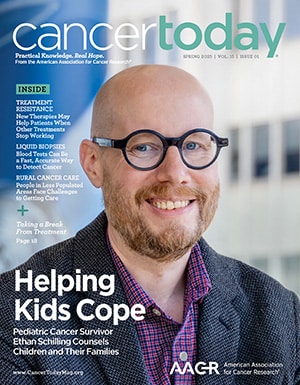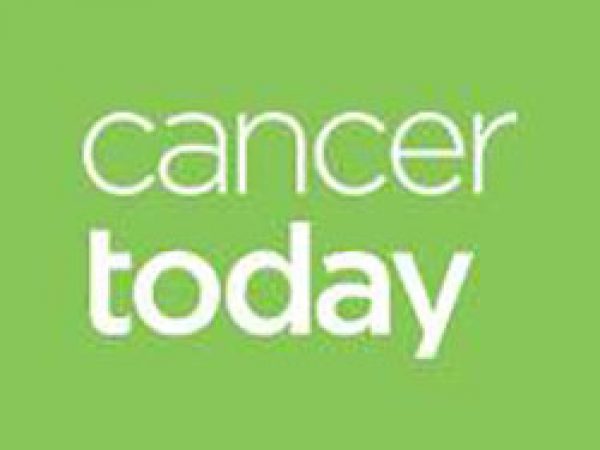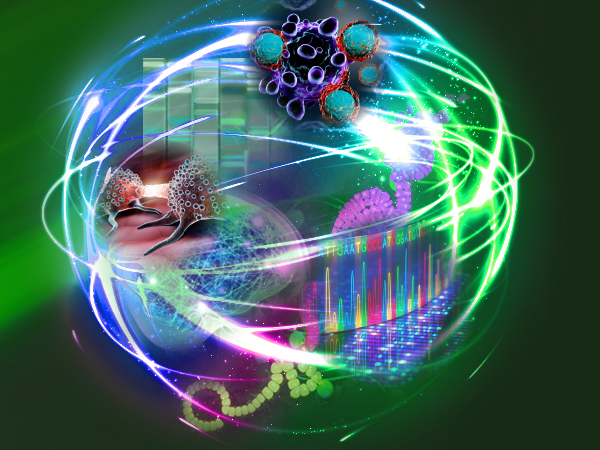Cancer Today’s Spring 2025 Issue: How Liquid Biopsies Can Guide Treatment Decisions, Extending Survival in Treatment-resistant Breast Cancer, and More
After Craig Schumpert learned he had lung cancer that had spread to his brain, bones, and lymph nodes, he started radiation therapy. His oncologist told him he might be eligible for targeted therapy, but he would have to wait four to six weeks for results from tumor tissue testing. The possibility of targeted therapy sounded promising, but the wait did not. “When you get diagnosed with cancer, it’s like, get me on some kind of treatment,” Schumpert says. But his doctor also ordered a liquid biopsy test that could detect traces of cancer in his blood. Those results came back just a week later, revealing a fusion in the ALK gene. Schumpert started taking an ALK inhibitor, and within weeks, the tumor began to shrink.

While tumor tissue testing remains the gold standard for guiding cancer treatment choices, Schumpert’s story illustrates how liquid biopsies can provide information about cancer in less time. In the feature story, which appears in Cancer Today, a magazine and online resource for cancer patients, survivors, and caregivers published by the American Association for Cancer Research (AACR), oncologists describe how they use liquid biopsies to care for patients with many types of cancer, and what people with cancer should know.
Another story in the spring issue details how people with metastatic hormone receptor-positive breast cancer are living longer with the disease, thanks to a growing number of treatment options. Although metastatic hormone receptor-positive breast cancer remains incurable, new targeted treatments and endocrine therapies can help keep the cancer in check. “Even if we can’t cure the disease, the promise is we’ll be able to switch from one treatment approach to another and have a series of therapies that may be helpful to extend life and hopefully maintain quality of life,” William Gradishar, MD, a medical oncologist at the Robert H. Lurie Comprehensive Cancer Center in Chicago, says in Cancer Today.
In the same issue, Cancer Today explores the challenges that come with receiving cancer treatment in rural areas. An estimated 20% of the American population resides in rural areas, but just 3.1% of medical oncologists and hematologists practice there. These patients often face significant barriers to receiving care, including long travel times and limited access to specialists and clinical trials.
People with cancer also face the challenge of finding adequate mental health support. A profile of hospital psychologist Ethan Schilling describes his experiences as a childhood cancer survivor and how his mother helped to support him and his twin brother, Derek, after they were both diagnosed with the same rare brain tumor at different ages. Today, Schilling focuses on approaches that help children and young adults identify healthy strategies for coping with their new reality. “Cancer and brain tumors are a big part of my identity, and I see it as part of my role and passion to advocate and do what I can to make things better for these folks and their families,” Schilling says.
Cancer Today’s latest issue also highlights practical information for patients, including analysis of a study on an experimental treatment for cancer cachexia. Stories also offer advice on topics ranging from dealing with treatment-related changes to taste and smell to the power of mindful breathing in alleviating cancer-related pain and anxiety. Plus, William G. Nelson, MD, PhD, director of the Johns Hopkins Kimmel Cancer Center in Baltimore and Cancer Today’s editor-in-chief, provides commentary about the promise of FLASH radiation, which delivers high doses of radiation in just milliseconds to reduce damage to normal tissue while still killing cancer cells.
The AACR offers Cancer Today free of charge to those affected by cancer. To view content from the spring issue, visit Cancer Today’s website or read the digital edition.
To stay up to date with the latest in cancer research and care, subscribe to the magazine or sign up to receive Cancer Today’s e-newsletter released twice a month.



